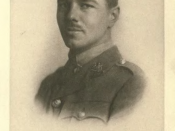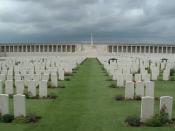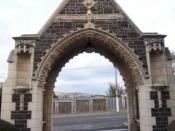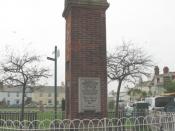Ignorance of War As civilians we delude ourselves of the honor and glory that serving one's country brings. Wilfred Owen, in his poem "Dulce et Decorum Est"� depicts the cold reality of war in the hopes of convincing our generation to pass the truth to our children, that they might see there is no glory or honor at all, just horror and despair. Owens narrates his experience in battle by taking us with him to share the pain, both physical and emotional. His words, vivid and descriptive, haunt us with their portrayal of war's atrocities.
In the first stanza, the mood is slow and solemn as we are pulled in. Our senses are dulled as we react to the men that we are being introduced to. Owen's use of imagery makes the soldiers' poor physical state very apparent as they are "Bent doubled"� and "Knock-kneed, coughing like hags"� (Lines 1 and 2).
As the poem continues, his choice of words depicts their long, arduous journey to an unknown finish "And towards our distant rest began to trudge"� (Line 4). Their fatigue is obvious as "Men marched asleep"�. Exhausted and drained, the men continue on in a lifeless trance, oblivious to their surroundings, "All went lame; all blind; Drunk with fatigue"� (lines 6 and 7). Even "the hoots of disappointed shells the drop behind"� could not interfere with the death-like march of these shattered men (Line 8). Owen consciously leaves the reader needing to fill the void that they're feeling at this point.
The pace quickens into the second stanza and we are immediately caught up in the frenzy and confusion of a gas attack. "Gas! Gas! Quick, Boys!"� (Line 9). The author's use of poignant action verbs is the only constant in this mode of panic that has arisen. We share the men's anxiety as they are "fumbling"�, "stumbling"�, and "floundering"� (lines 9, 11, and 12). We feel their loss of control. It is at this point, at the end of the second stanza, that Owen cleverly slows the mood. His change in vocabulary subtly suggests a more solemn scene where the reader becomes witness to a fallen soldier's fate. "Dim, through the misty panes and thick green light, As under a green sea, I saw him drowning."� (Lines 13 and 14).
The author's adept writing skills are expertly applied as he uses the third stanza to his own accord. It is here and now that he wants to, and does, capture his audience. He brings the reader directly into focus. He has moved from telling a story to speaking directly to us. He also takes this opportunity to convey his personal thoughts and feelings. Owen is outright and forthright in expressing himself as he watches his comrade dies "In all my dreams, before my helpless sight, He plunges at me, guttering, choking, drowning."� (Lines 15 and 16). He leaves no doubt in anyone's mind of the helplessness and despair he is feeling. We know this is a moment that will be forever etched in his heart and mind.
The fourth and final stanza is purposeful and strong. Owen speaks to the reader pointedly in a deliberate attempt to steer him where he wants him to go "If in some smoothing dreams you too could pace"� (Line 17). He wants us to feel what he feels, so we can believe what he believes. He guarantees his success with clear, profound images "like a devil's sick of sin"� and "Obscene as cancer"� describing things that anyone of us could not only relate to and understand, but also cringe and even cry at (Lines 20 and 23). His vivid images are haunting and leave nothing to the imagination. The force of his words demand that we see through his eyes "the blood come gargling from the froth-corrupted lungs"� (Lines 21 and 22). In one line Owen continues to prey on our emotions as he cleverly and even shrewdly introduces his intention. "Of vile, incurable sores on innocent tongues"� dares us to know and admit that these soldiers were young innocents before being ravaged by the horrors of war (Line 24). The author takes advantage of our vulnerability at this stage as he befriends us and pleads that we be honest with our children when we speak of war, "My friend, you would not tell with such high zest To children ardent for some desperate glory,"� (Lines 25 and 26).
He begs us not to glorify the horror of war by proclaiming "the old Lie: Dulce et decorum est Pro patria mori"� (Lines 27 and 28). If his poem has accomplished what he has aspired it to, then we will know, as will our children, that it is not "sweet and proper to die for one's country"�.





